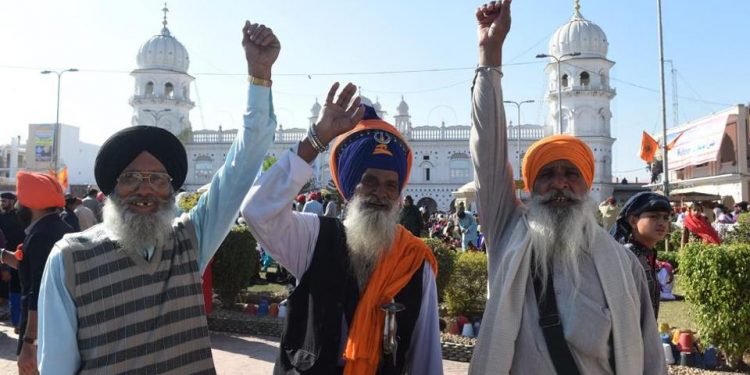New Delhi: The presence of Khalistani elements in Pakistan, including separatists arriving from countries like the US, UK and Canada, and the possibility of their mingling with Sikh pilgrims from India in Kartarpur has been a matter of concern for India.
Intelligence agencies have warned that Sikh fundamentalist organisations like Sikhs For Justice (SFJ) plan to use the Kartarpur corridor to further their secessionist agenda.
The SFJ is supported by Pakistan-based handlers to provide money and logistical support to local terrorists in Punjab to carry out subversive activities.
India has raised the alarm that several gurdwaras in Pakistan are being used to promote pro-Khalistan messages and have shared inputs regarding pamphlets being distributed on the so-called “Sikh Referendum 2020”, for a separate state.
The SFJ is headed by Avtar Singh Pannun and Gurpatwant Singh Pannun, who advocate a separate Khalistan state.
India is concerned over attempts by Pakistan to revive other banned organisations like Khalistan Liberation Force (KLF), Babbar Khalsa International (BKI), Khalistan Commando Force (KCF), Khalistan Zindabad Force (KZF) and International Sikh Youth Federation (ISYF).
Some Pakistan-based terrorist groups were found to be engaged in smuggling weapons into India in the aftermath of the August 5 revocation of Article 370 in Jammu and Kashmir.
Intelligence agencies are also worried over drones carrying weapons coming from Pakistan. Two drones apparently smuggling weapons into India from across the border were recovered near the India-Pakistan border. The drones were spotted in Jhabal town in Tarn Taran district.
India also raised concerns with Pakistan after Gopal Singh Chawla, a known separatist and aide of terrorist Hafiz Saeed, was made a member of a 10-member committee for managing the Kartarpur Sahib Corridor.
Pakistan’s official video on Kartarpur, released on November 1, featured Khalistani terrorists and anti-Indian elements including Jarnail Singh Bhindranwale. his military adviser Shabeg Singh, who were killed during Operation Blue Star in 1984. It also featured a poster by the banned Sikhs for Justice group.
India lodged a protest over the presence of these ‘objectionable’ elements in the video.
The presence of a poster on an ‘Indian bomb’ next to the Durbar Sahib Gurdwara in Kartarpur has also raised eyebrows in India.
A board erected by Pakistani authorities next to an exhibit featuring a small bomb, claims that it was dropped on the shrine by the Indian Air Force during the 1971 war.
The poster, with lines in Urdu, Gurmukhi and English, is titled ‘Miracle of Wah Guru ji’.
It says: “Indian Air Force dropped this bomb during 1971 at gurdwara Darbar Sahib Sri Kartarpur Sahib with the aim to destroy it. However, this evil design could not be materialised due to blessing of Waheguruji (Almighty Allah). The said bomb landed into Sri Khoo Sahib (sacred well) and the Durbar Sahib remained unheart (sic). It is pertinent to mention that this is the same sacred well from where Sri Guru Nanak Dev ji used to get water to irrigate his fields.”
The bomb has been placed within a glass case placed atop a small pillar decorated with the ‘khanda’, a symbol representing the Sikh faith.
There is apprehension that Pakistan wants to create leverage within the Sikh community using the corridor. Pakistan has also laid the foundation stone for a Guru Nanak Dev University in Larkana town.
IANS







































